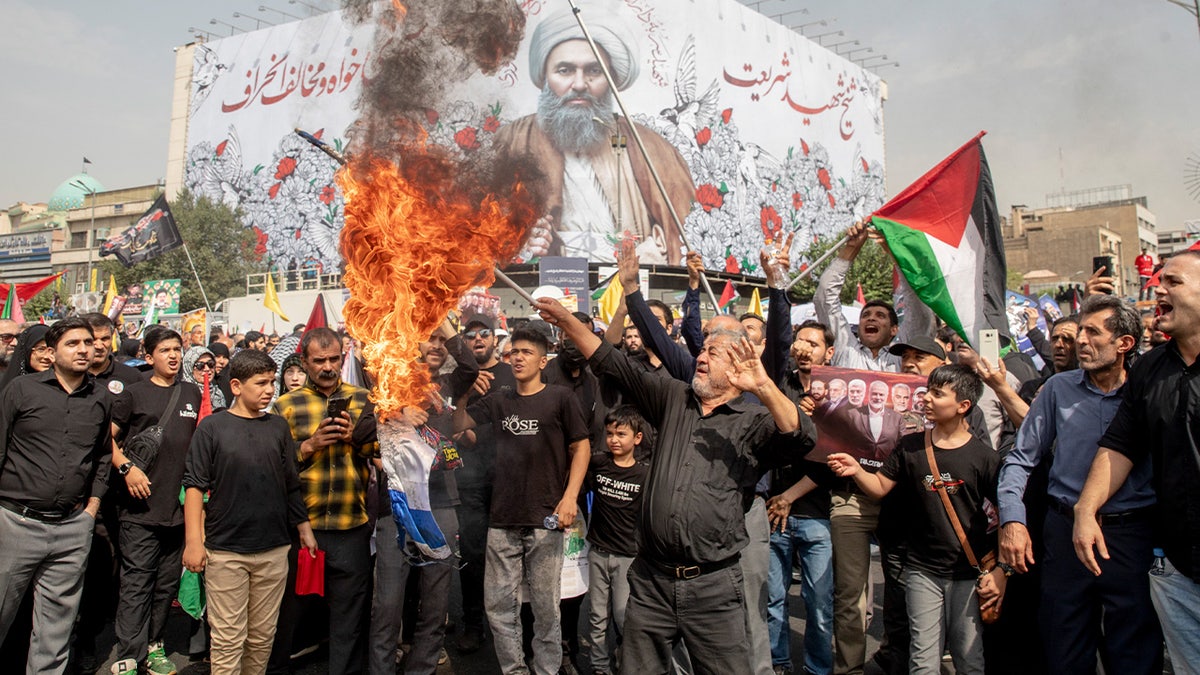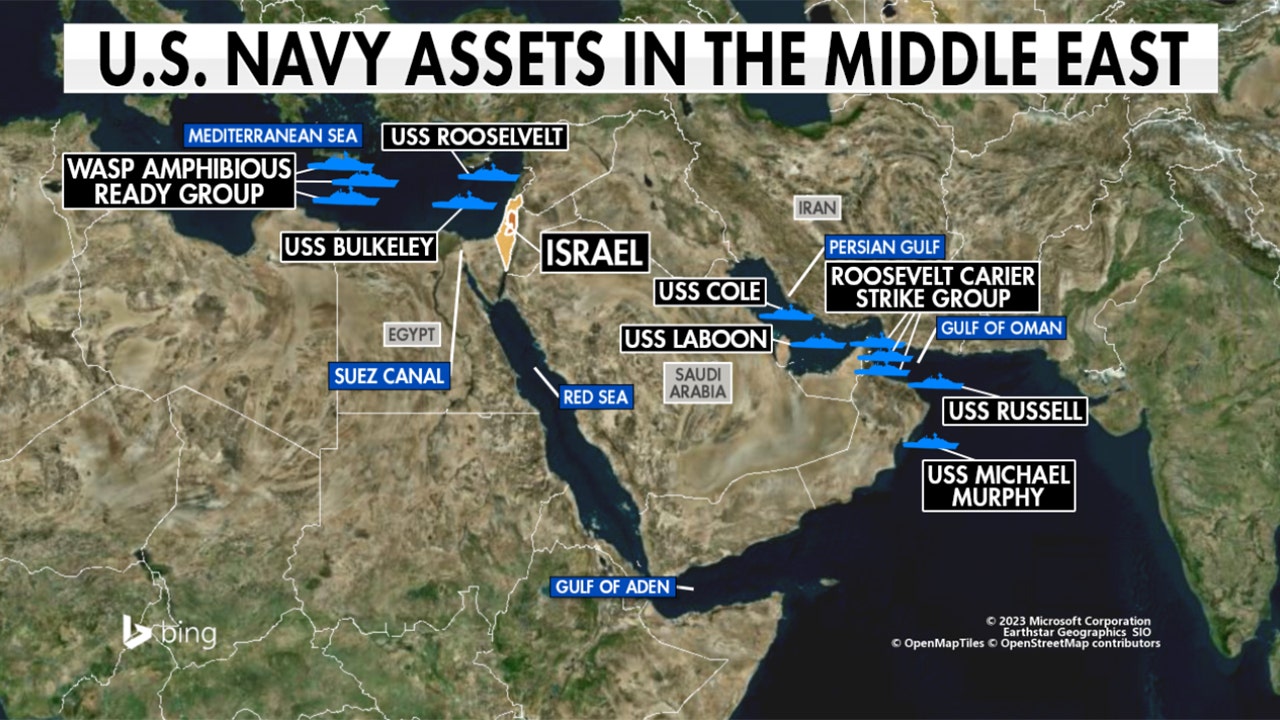Iran may be reconsidering attacking Israel in retaliation for the alleged assassination of a high-ranking Hamas leader, but experts question the impact U.S. assets in the region played in the change of heart.
After months of seeing the U.S. Navy patrol the region without answering Iranian escalations, Tehran is unlikely to be responding to fear of American reprisals, Richard Goldberg, a senior adviser at the Foundation for Defense of Democracies, told Fox News Digital.
“Khamenei sees a glorified military parade more than a credible military threat, and that will continue to be true until he’s proven wrong,” Goldberg said. “It’s not sustainable over the long run to be held hostage to the Islamic Republic of Iran and its terror proxies.”
IRAN IS LIKELY WEIGHING ‘RISK OF FAILURE’ BEFORE POTENTIAL ISRAEL STRIKE: JOSEPH VOTEL
A map depicting U.S. Navy assets stationed in the Middle East. (Fox News)
The only way to restore deterrence is to restore sanctions and demonstrate a willingness to take military action, he added.
“The alternative is surrender to a nuclear-armed maniacal terror-sponsoring regime, and that’s a catastrophic outcome not just for the Middle East but for U.S. national security writ large,” Goldberg said.
Israeli media reported Thursday that Iran may backtrack on plans to retaliate for the assassination of Hamas leader Ismail Haniyeh, for which Iranian officials have blamed Israel. However, officials later determined Haniyeh died not from a missile strike but from a bomb planted in his room, according to The Times of Israel.
U.S. officials still expect Iran to respond to Haniyeh’s death, but the response will likely take a more measured form, they believe. State Department spokesperson Matthew Miller told reporters Monday that Washington has urged countries to impress upon Iran “that it is very much not in their interest to launch another attack on Israel.”
A U.S. official last week told Fox News Digital that reports of 12 warships deployed to the region over concerns about escalating tensions following the assassinations were not true, and that “no official tasking has been given” to the vessels, which were already in the Middle East. The official noted that the ships remain spread out, with some even in ports or conducting routine operations, and that none of the vessels are near any locations of interest.
James Carafano, an E.W. Richardson fellow at the Heritage Foundation and a 25-year Army veteran, told Fox News Digital any asset deployments would only occur in addition to back-channel discussions, but he doubted the impact much of those discussions would have on Iran’s decision-making.
“We don’t always go on the back channel, but if you just listen to American diplomacy, I mean … it’s completely useless,” Carafano said. “It’s really hard for me to ever conceive of the universe where what we’ve been doing publicly has any impact on Iranian behavior whatsoever.”
HEZBOLLAH IS THE ‘X-FACTOR’ IN LOOMING ISRAEL, IRAN WAR WITH ‘NATION STATE CAPABILITIES’
Carafano said three things could be at play: Israel’s “very surgical, very strategic, very proportional strike” capability that offers reprisal without escalation; Lebanon’s chaotic domestic situation “that could fall apart five minutes after a war started;” and the potential for growing political protests to spread to other parts of the world and impact Iran.
“We see this revolution going on in Venezuela, and green revolutions like the Arab Spring have a tendency to spread,” Carafano said. “So, that’s a big risk on the part of the Iranians.”

Iranians burn a representation of the Israeli flag at Enqelab-e-Eslami Aug. 1, 2024, in Tehran, Iran, during the funeral ceremony of Hamas leader Ismail Haniyeh and his bodyguard, who were killed in an assassination blamed on Israel. (Majid Saeedi/Getty Images)
Carafano noted that the U.S. has “deployed every capacity to reach pretty much any kind of target” in the Middle East already, with the recent deployment of F-22s only adding to an already robust presence in the region.
“We’ve deployed a significant amount of military power to the region, and it was all military power with deep-strike capability,” Carafano said, noting it’s “a powerful statement.”
U.S. Central Command (CENTCOM) posted on social media platform X that the Air Force had deployed F-22 Raptors on Thursday “as part of U.S. force posture changes in the region and to address threats posed by Iran and Iranian-backed groups.”
CENTCOM had announced the raptor deployment a full week earlier, citing again the need to deter Iranian attack on Israel.

The U.S. Central Command announced Thursday that “U.S. Air Force F-22 Raptors arrived in the U.S. Central Command area of responsibility Aug. 8 as part of U.S. force posture changes in the region and to address threats posed by Iran and Iranian-backed groups.” (U.S. Central Command)
While Goldberg acknowledged that the U.S. has repositioned some assets in the region, he disagreed that there has been a “surge” in recent weeks that would have altered Tehran’s thinking.
“In general, the notion of surging within the past week is more press release than reality,” Goldberg said. “The Lincoln just did a weekend port call in Guam and is unlikely to be on station before an Iranian attack occurs.
“Remember, U.S. Navy forces are already surged to the Red Sea and Gulf of Aden due to never-ending Houthi attacks on maritime shipping, and the ships already surged are the same ships you’d want to defend against an Iranian missile strike.”
Matt Mcinnis, a senior fellow for the Institute for the Study of War and a former intelligence officer, agreed that the weapons deployed likely only aided other ongoing diplomatic efforts to pressure Iran into changing course to avoid a major escalation. Iran’s neighbors have applied pressure over the past week to deter Tehran from creating an all-out war with Israel.
CLICK HERE TO GET THE FOX NEWS APP
“I do think that the additional forces, coming in, are supporting the diplomatic efforts right now to try to bring down the, the scope or the risk and the scope of potential Iranian actions against Israel,” McInnis told Fox News Digital. “So, I do think it is having an effect, but not out of concert with some of the other, you know, diplomatic efforts that are going on.
“Overall, I think they’re having to make some tough choices on our posture between the Middle East, European and particularly the Indo-Pacific theaters right now,” he added. “It’s always a challenge to move forces back into the Middle East, but I think, right now, given available resources, they’re calibrating this probably as best as they can right now.”





